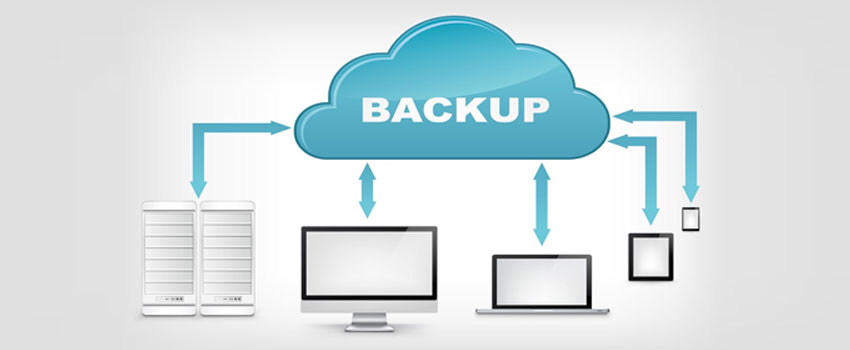Backup – There is no such thing as business sustainability without a data backup. A business can be lucky enough to sustain its business operations without experiencing a major data loss, but there are always chances of sudden data loss. A data loss can occur due to any reason, such as hardware malfunction, accidental deletion, cybercrime, natural disaster, etc. Since digital data is highly valuable for businesses today, the best approach is to have a reliable and efficient data backup system in place. There are different approaches to do data backup, therefore this blog present the best data backup approaches you can pick from.
On-Premises Data Backup
The most traditional way of data backup is the on-premises backup. An on-premises backup is a data backup process in which you copy the data to a storage device that is placed in-house. The backup can be done manually or automatically depending on the backup software you use to copy data. The common mediums of on-premises data backup include an external hard drive, network-attached storage (NAS), tape drive, etc.
Some of the key benefits of on-premises data backup include:
- It provides access to data backup without an internet connection. So, in case of internet issues at the workplace, you still have access to your on-premises backed-up data.
- It provides you full control of the backed-up data. The associated hardware and software in your data center are also managed and controlled by you.
- Although it is expensive to set up a proper on-premises backup storage system along with regular maintenances, still it becomes cheaper in a long run. So, large businesses that can afford the initial expenditure of on-premises data backup can witness cheaper expenses related to it in the future.
- It provides more sense of security, as the data is backed up in external hard drives, tape backups, or other mediums which are not linked to the internet. So, it saves the data from getting breached by cybercriminals.
Cloud Data Backup
The trending and advanced way of data backup in present times in cloud data backup. A cloud data backup is a data backup approach where you take the services of a cloud backup provider to back up your business data on their servers. Basically, you are uploading your data to the cloud that is managed by cloud backup services. This way, you don’t have to worry about maintaining on-premises hardware or allocating proper physical space and environment for keeping locally backed-up data.
Some of the key benefits of cloud data backup include:
- It let your business have unlimited data storage. All you need is to subscribe to the storage capacity you need and later decrease or increase as per your needs. This way, you never have to worry about storage limits.
- It provides anywhere, anytime access to the backed-up data. In the times of the COVID-19 pandemic, the ability to perform backup and recovery from anywhere at any point in time is a great blessing.
- Although data is stored on the remote servers of the cloud service provider via the internet, still it provides robust security. It is because most of the cloud backup services encrypt the data before storing it at their remote location, so it’s not an easy job for cybercriminals to get access to the data.
- As data is not stored locally, so any malfunction of local hardware or software will have no effect on the cloud backup data. In addition, cloud backup services further duplicate your backup data and store it in multiple remote locations. This way, even if they experience a malfunction in one of their data centers, your data is still secure in the other location. In short, cloud storage ensures reliable disaster recovery.
- Its major attractive element is the cost-saving impacts for businesses. Cloud backup solutions are based on monthly or annual subscriptions based on the storage needs of a business for its file system. In addition, the rates are also quite economical compared to what it costs to set up an on-premises backup system. Therefore, small and medium businesses can find cloud backup the best solution to meet their backup needs in a cost-effective way.
There are multiple cloud backup services available today, so you must carefully evaluate the shortlisted services and pick the one that best addresses your business backup needs.
Hybrid Data Backup
Hybrid data backup lets businesses take advantage of both on-premises backup and cloud backup. In a hybrid data backup, you will be backing up data in the cloud, while a copy of its is also stored on-premises. This way, you can have two copies of your business crucial data. This approach is best for those businesses who have a highly-sensitive data to protect and cannot trust just one on-premises or cloud backup. It is a bit expensive compared to just having either an on-premises or cloud storage solution, so it’s recommended for only those businesses who have the capital to bear such expenses.
Some of the key benefits of hybrid data backup include:
- It provides a more reliable disaster recovery plan. If your on-premises backup data gets corrupted, you still have access to cloud backup data.
- It gives you accessibility freedom, as the cloud backup data is accessible continuously from anywhere. In addition, if your internet connection is down, then the data stored on-premises is there to rescue.
- It let smart management of data backups. You can backup most sensitive data both in the cloud and on-premises, while less sensitive data can be backed up in only one medium.
Wrapping Up
Owing to the growing importance of data backup, there are plenty of ways for businesses to backup data. On-premises, cloud, or hybrid backups all are reliable ways to perform data backup. But if you have to pick any one of them, then it depends on your business capital and sensitive data volume.
For example, if your backup data volume is less and you can afford to have on-premises hardware and software for data backup, then the on-premises backup can be picked. But if you have significant data volume to backup and want to get other advantages, such as always accessibility, cost-friendly backups, and unlimited storage space, then cloud data backup is the best choice. On the other hand, hybrid data backup is ideal when your business has enough capital to afford both on-premises and cloud backup expenses.




